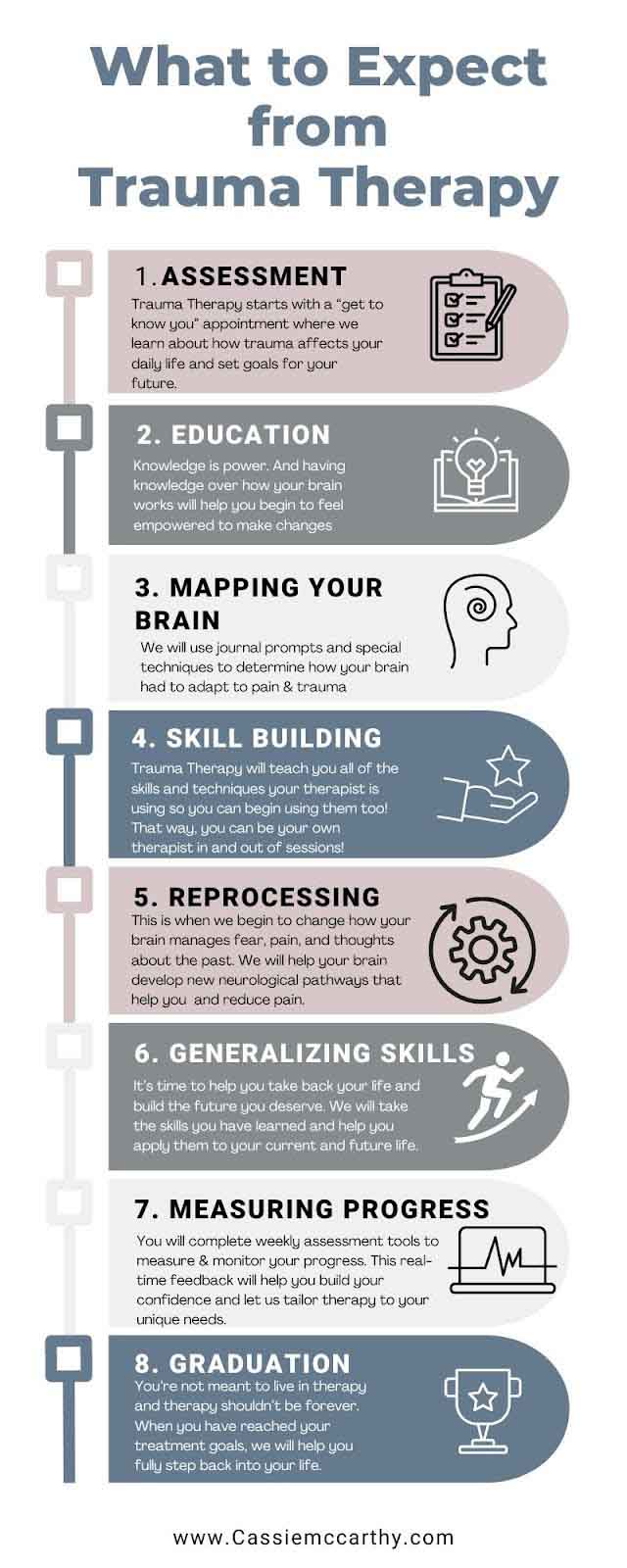Have You Tried Therapy in the Past but Didn’t Get the Help You Needed?
If you’ve tried traditional talk therapy and it didn’t quite work for you, you’re not alone. While talk therapy can be helpful for many issues, when it comes to trauma, you might need something more focused and structured. Trauma Therapy is specifically designed to help people who are dealing with the effects of a painful, frightening, or violent past—whether it’s emotional, physical, or sexual trauma. This approach can provide the deeper healing you’ve been searching for.
If you feel stuck or overwhelmed by memories, emotions, or anxiety, Trauma Therapy can offer a path to healing and freedom from the past. Let’s dive into how trauma therapy works and whether it’s the right fit for you.
What is Trauma Therapy?
Trauma Therapy is a specialized, evidence-based approach designed to help people heal from past experiences that still affect their lives today. Trauma can take many forms—emotional, physical, psychological, or sexual—and it often leaves deep wounds that traditional therapy might not fully address.
Trauma Therapy is different because it focuses on helping you process and heal from the root cause of your pain. Whether it’s difficulty trusting others, feeling safe, or struggling with self-esteem, Trauma Therapy is designed to help you regain control and live a life free from the grip of the past.
Who Benefits from Trauma Therapy?
Trauma Therapy can help if you:
- Have experienced abuse or control in relationships
- Are dealing with PTSD
- Struggle with the impact of childhood trauma or family turmoil
- Feel stuck in fear, shame, or self-blame
- Experience nightmares, flashbacks, or intrusive thoughts
- Find it hard to trust and feel safe in relationships
If these experiences resonate with you, trauma therapy can help you break free from the past and move forward with your life.
How Does Trauma Therapy Work?
Trauma Therapy is designed to help you change the way your brain processes traumatic events, giving you the tools to manage your thoughts and feelings. I use Cognitive Processing Therapy (CPT), an evidence-based, structured approach that’s specifically designed to help people recover from trauma.
CPT focuses on:
- Reprocessing traumatic memories: Rather than avoiding or being overwhelmed by your trauma, CPT helps you address and reframe the traumatic experiences that are still affecting your life.
- Challenging negative beliefs: Many trauma survivors struggle with distorted beliefs like self-blame or guilt. CPT teaches you how to recognize and challenge these thoughts.
- Building practical skills: Trauma Therapy is not just about talking—it’s about learning the tools you need to cope with triggers and difficult emotions in your daily life.
With CPT, you can make significant progress in understanding and reducing the impact of trauma on your thoughts, emotions, and behaviors.
What Makes Trauma Therapy Different from Traditional Talk Therapy?
While traditional therapy often focuses on exploring feelings, Trauma Therapy is more structured and results-focused. Here’s why it stands apart:
- Measurable progress: Trauma Therapy, especially with CPT, uses tools to track your progress and ensure you’re seeing results within 6-8 sessions.
- Brain-based: Trauma Therapy is backed by science and designed to help you retrain your brain to process trauma in a healthier way.
- Structured approach: Each session builds on the last, giving you a clear roadmap to healing.
- Evidence-based: Techniques used in Trauma Therapy, like Cognitive Processing Therapy, are backed by research and proven to work for PTSD and trauma recovery.
The difference is clear: Trauma Therapy gives you actionable steps to heal, instead of just talking about your feelings.
What to Expect from Trauma Therapy Sessions
In a typical Trauma Therapy session, we’ll follow a structured approach to keep your healing on track:
Measuring & Monitoring Progress:
We’ll start each session by assessing your progress to ensure you’re moving forward.
Reviewing Homework:
Trauma Therapy often includes homework assignments to practice the skills you’re learning, so we’ll review these together.
Learning New Skills:
Each session introduces new tools for managing your thoughts and emotions.
Practicing Skills:
We’ll practice the new skills together to help you feel confident using them on your own.
Assigning Homework:
You’ll receive specific tasks to reinforce what you’ve learned and help you stay on track between sessions.
This structured process is designed to make sure you’re consistently working toward recovery and building skills that will help you long after therapy ends.
Is Trauma Therapy Right for You?
Trauma Therapy requires commitment and a willingness to do the work—but if you’re ready to change your life, it can be incredibly rewarding.
Signs Trauma Therapy Might Be Right for You:
- You frequently find yourself thinking about past trauma, even when you don’t want to (including flashbacks, nightmares, and intrusive thoughts).
- You struggle to feel safe or trust in relationships.
- You’ve been experiencing anxiety, depression, or withdrawal since your trauma.
- You’ve tried other forms of therapy, but still feel stuck.
- You’re ready for a structured, results-focused approach that helps you move forward.
If you’re ready to stop living in the shadow of your past and take control of your future, Trauma Therapy could be the answer.
Start Healing Today
You don’t have to stay stuck in the pain of your past. Trauma Therapy using Cognitive Processing Therapy (CPT) can help you regain control, improve your relationships, and feel safe again. Schedule a free 20-minute consultation today to start your healing journey.
Ashley’s Journey to Reclaiming Her Life
When Ashley first reached out, she was living what looked like a successful life on the outside. She had a great career, supportive friends, and appeared to be holding it all together. But behind closed doors, Ashley was unraveling. She dreaded going to bed because that’s when her mind would spiral. Every night, flashes of painful memories from her past assaults would flood her thoughts, leaving her exhausted by morning. She couldn’t understand why she was still affected by something that happened so long ago.
During the day, Ashley tried to keep herself busy. She worked hard, exercised, and maintained an active social life. But it didn’t matter how much she accomplished—inside, she felt disconnected and on edge, constantly worried something bad was about to happen.
The Breaking Point
Ashley’s life felt like a balancing act, and she was terrified that everything would come crashing down. One day at work, after making a minor mistake, she spiraled into panic. She couldn’t stop replaying it in her mind, and the overwhelming sense of failure and self-blame became unbearable. It was in that moment Ashley realized that no matter how hard she tried, she couldn’t outrun her past. She needed help.
Starting Trauma Therapy
Ashley came to therapy unsure of what to expect. She’d tried talk therapy before, but it didn’t help her feel better. This time, though, she was determined to give it another shot. Therapy with me wasn’t just about talking—it was structured, with specific goals in mind. Ashley began learning how her brain processed her past trauma and how that was affecting her every day.
Through Cognitive Processing Therapy (CPT), Ashley started to see a shift. She learned practical tools to manage her thoughts, challenge negative beliefs, and reframe how she viewed her past. The trauma wasn’t controlling her life anymore—she was.
Regaining Control
Within a few weeks, Ashley began noticing changes. The panic attacks were less frequent, and she started sleeping better. Instead of avoiding her memories, she learned to face them in a way that didn’t leave her feeling overwhelmed. She gained control over her thoughts, and that sense of calmness began to seep into other areas of her life. Her work performance improved, she reconnected with friends, and, most importantly, she started trusting herself again.
Ashley’s transformation didn’t happen overnight, but with commitment and hard work, she finally began to feel like herself again. Trauma therapy helped her process her past in a healthy way and gave her the tools she needed to move forward.
Today, Ashley feels a sense of empowerment she didn’t think was possible. She can look back at her past without being trapped by it, and for the first time in years, she’s excited about the future.
*Ashley is a composite of several people I have worked with and helped over the years. I changed all personal and identifying information to protect the privacy of women with whom I have worked.
It All Starts with a Call
Healing can begin today. Schedule a free 20-minute phone call to discuss what’s been keeping you stuck, what you’ve tried that hasn’t worked, and how I can help you move forward.




